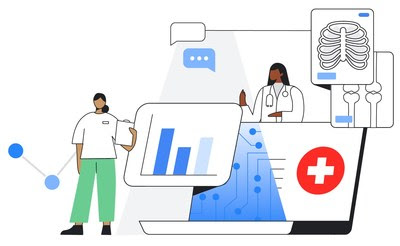Google Cloud Partners with Healthcare Companies to Develop Medical Imaging Suite
 Medical Imaging Suite, a new industry solution designed to make imaging healthcare data more accessible, interoperable and useful, has been launched by Google Cloud. Google Cloud enables the development of AI for imaging to support faster, more accurate diagnosis of images, increased productivity for healthcare workers, and improved care access and outcomes for patients.
Medical Imaging Suite, a new industry solution designed to make imaging healthcare data more accessible, interoperable and useful, has been launched by Google Cloud. Google Cloud enables the development of AI for imaging to support faster, more accurate diagnosis of images, increased productivity for healthcare workers, and improved care access and outcomes for patients.
"Google pioneered the use of AI and computer vision in Google Photos, Google Image Search, and Google Lens, and now we're making our imaging expertise, tools, and technologies available for healthcare and life sciences enterprises," said Alissa Hsu Lynch, Global Lead of Google Cloud's MedTech Strategy and Solutions. "Our Medical Imaging Suite shows what's possible when tech and healthcare companies come together."
Google Cloud's Medical Imaging Suite addresses common pain points organizations face in developing AI and machine learning models, and uses this to enable data interoperability. There are several components of the new Medical Imaging Suite.
Imaging Storage: Cloud Healthcare API, part of the Medical Imaging Suite, allows easy and secure data exchange using the international DICOMweb standard for imaging. Cloud Healthcare API provides a fully managed, highly scalable, enterprise-grade development environment and includes automated DICOM de-identification. Imaging technology partners include NetApp for seamless on-prem to cloud data management, and Change Healthcare, a cloud-native enterprise imaging PACS in clinical use by radiologists.
Imaging Lab: AI-assisted annotation tools from NVIDIA and MONAI help automate the highly manual and repetitive task of labeling medical images, and Google Cloud also offers native integration with any DICOMweb viewer.
Imaging Datasets & Dashboards: Organizations can use BigQuery and Looker to view and search petabytes of imaging data to perform advanced analytics and create training datasets with zero operational overhead.
Imaging AI Pipelines: Using Vertex AI on Google Cloud can accelerate development of AI pipelines to build scalable machine learning models, with 80% fewer lines of code required for custom modeling.
Imaging Deployment: Finally, the Medical Imaging Suite offers flexible options for cloud, on-prem, or edge deployment to allow organizations to meet diverse sovereignty, data security, and privacy requirements—while providing centralized management and policy enforcement with Google Distributed Cloud, enabled by Anthos.
Hackensack Meridian Health, a network of healthcare providers in New Jersey, is beginning to use the Medical Imaging Suite to de-identify petabytes of images with future plans to build AI algorithms to predict metastasis in patients with prostate cancer, a life-threatening outcome disproportionately affecting Black men in the US.
"We are working towards building AI capabilities that will support image-based clinical diagnosis across a range of imaging, and be an integral part of our clinical workflow," said Sameer Sethi, SVP and chief data and analytics officer at Hackensack Meridian Health. "Google Cloud's imaging capabilities, including standardized storage and de-identification, are helping us unlock the value of our imaging data so clinicians and researchers are equipped with digitized decision support that fits into their clinical workflow. Google's Medical Image Suite is also fundamental to us applying AI and machine learning to this data to predict and prevent disease, helping to save more lives."
Hologic, a global medical technology company, developed the first CE-marked digital cytology platform for laboratories, which combines a new AI algorithm for cervical cancer screening with advanced volumetric imaging technology. The platform helps cytologists and pathologists identify precancerous lesions and cervical cancer cells in women. Next, Hologic plans on expanding the platform's capabilities using the Medical Imaging Suite.
"We've partnered with Google Cloud to use the Medical Imaging Suite to enhance our current Genius Digital Diagnostics System," said Michael Quick, vice president of Research and Development, Innovation at Hologic. "By complementing our expertise in diagnostics and Al with Google Cloud's expertise in AI, deep learning, and its cloud-based technologies for imaging storage, we're evolving our market-leading technologies to improve laboratory performance, healthcare provider decision-making, and patient care."
Related Articles
Citation
. Google Cloud Partners with Healthcare Companies to Develop Medical Imaging Suite . Appl Radiol.
October 5, 2022